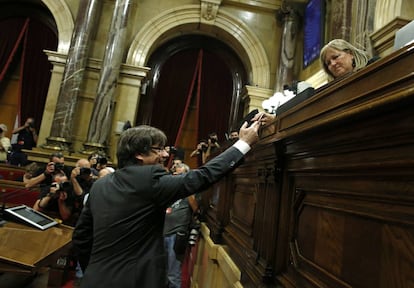Orwell and Catalan doublespeak
Far from being a state clinging on to a Francoist past, Spaniards and Catalans love democracy

If today’s decision in the Catalan parliament really does give birth to a new Republic, history will record that half the midwives were missing at the crucial moment. None of the non-nationalist opposition parties was present when the vote was taken. Walking away from an argument is seldom a good political choice but the open eyes of the opposition groups could see no other way. Senior lawyers to the parliament advised that this vote was illegal. In judicial terms it is meaningless. The Catalan parliament has no more right to declare unilateral independence than it does to criminalize smoking on the streets of Rome. It is not difficult to understand why opposition groups refused to be caught up in this reckless, legislative farce. Constitutional law is the foundation of all democratic states. Those who, like Catalan regional premier Carles Puidgemont, seek to ride roughshod over the rules do so at their peril.
It is more difficult to comprehend why the opposition parties have been dubbed ‘fascist’ or ‘Francoist’ because of their concern for rules based politics. The image of General Franco is still potent in Spain – the dictator only died in 1975 – and the memory of his totalitarian regime is still very much alive. Separatists use the term to close down inconvenient arguments and silence critics. There is no need for any further debate if your opponent is a Francoist, right? But it is also echoed by foreign commentators whose knowledge of Catalan politics seems to be based on reading George Orwell’s Spanish civil war novel Homage to Catalonia and occasional trips to Barcelona. Orwell, himself a rigorously clear thinker, would have been appalled by some of the arguments in today’s debate in the Catalan parliament and the vote for secession.
The Catalan parliament has no more right to declare unilateral independence than it does to criminalize smoking on the streets of Rome
Orwell would not have overlooked the fact that the parties that boycotted the vote today actually represent the majority of Catalans. Electoral systems do not always produce perfectly representative results. Just as Donald Trump became President of the United States with fewer votes than Hillary Clinton, the Catalan separatists won fewer votes than non-nationalist parties in the last Catalan elections (2015). This drive to independence is being driven by a minority government against the expressed wishes of the majority. So, unable to claim a majority of popular votes, the separatist administration based the claim for independence on the results of the referendum held on October 1.
This is odd because the separatists were the first to cry foul and claim that this vote was deeply flawed. They were right then and they are right now. The chaos and violence that surrounded the plebiscite of October 1 should never have happened. The vote should never have been called in the way it was and the police should never have reacted in the way they did. That is precisely why the secessionist administration in Barcelona cannot now claim that the shambolic poll of October 1 is a legitimate basis for independence.
Less that half the population voted. Some were prevented from voting, others did not want to vote. No politician in Barcelona can second-guess how either of those groups might have voted. They cannot logically claim voter absence as the basis for the declaration of an independent Republic. But that is just what nationalist legislators have now tried to do. Orwell would have understood the absurdity perfectly.
Orwell would not have overlooked the fact that the parties that boycotted the vote today actually represent the majority of Catalans
There was – and is – a way out of this impasse, one of which Orwell would have approved. As regional premier, Puidgemont has the unique power to call new elections in Catalonia. Many expected him to do so earlier in the week and one of his coalition members resigned when he did not. Fresh elections would give Catalans the chance to express their views an open, transparent, free and fair political process.
Like the rest of Spain, Catalans well know how this works. Far from being a state clinging on to a Francoist past, Spaniards and Catalans love democracy. There have been hundreds of national, regional and local elections in Spain and Catalonia since 1978. The reason that the Catalan premier does not want to call elections now has nothing to do with the ghost of Franco. Puidgemont does not want an election because he knows he will lose. That is a perfectly sensible reason to avoid a vote. But the Catalan premier should be open, honest and direct with the Catalan people about why he is denying them a say.
Were he alive today, it is what Orwell would be telling him to do.
David Fred Mathieson was a special advisor to the Labour government of Tony Blair.
Tu suscripción se está usando en otro dispositivo
¿Quieres añadir otro usuario a tu suscripción?
Si continúas leyendo en este dispositivo, no se podrá leer en el otro.
FlechaTu suscripción se está usando en otro dispositivo y solo puedes acceder a EL PAÍS desde un dispositivo a la vez.
Si quieres compartir tu cuenta, cambia tu suscripción a la modalidad Premium, así podrás añadir otro usuario. Cada uno accederá con su propia cuenta de email, lo que os permitirá personalizar vuestra experiencia en EL PAÍS.
¿Tienes una suscripción de empresa? Accede aquí para contratar más cuentas.
En el caso de no saber quién está usando tu cuenta, te recomendamos cambiar tu contraseña aquí.
Si decides continuar compartiendo tu cuenta, este mensaje se mostrará en tu dispositivo y en el de la otra persona que está usando tu cuenta de forma indefinida, afectando a tu experiencia de lectura. Puedes consultar aquí los términos y condiciones de la suscripción digital.








































